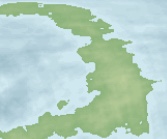The First Republic of Malorian Islands
The Republic of the Malorian Islands République des Iles Malorian | |
|---|---|
| 1910–1942 | |
|
Flag | |
 | |
| Capital and | St. Bernard |
| Official languages | French, English |
| Recognised national languages | French, English |
| Recognised regional languages | Spanish and Haitian |
| Ethnic groups (1911) | White (92%), Black (5%), Asian (1%), Hispanic (0.5%) |
| Demonym(s) | Malorianese |
| Government | Federal Marxist-Leninist one-party socialist republic |
• President of the Republic | Abraham Dubois |
• Vice President of the Republic | Veronique DuMond |
| Legislature | The Council of The Republic |
| The National Senate | |
| The House of Representatives | |
| Foundation Malorianese Revolutionary War | |
| Historical era | Post-colonial Era |
• Established | 1910 |
• Disestablished | 1942 |
| Today part of | |
The First Republic of the Malorian Islands was the first declared government of the Malorian Islands post-colonial rule by both the Spanish Empire and the French Empire (as well as the Third French Republic).
History
Reforms under President Dubois
After independence was made by the Republic of the Malorian Islands, President Dubois pushed reforms within the country to improve the nation's economy from a purely agricultural economy into a partially agricultural economy. Dubois made these reforms through a visa policy that encouraged entrepreneurs, industrialists, and workers to immigrate to the Malorian Islands. This policy enacted by the Dubois Administration was successful short term, but affected the nation long term.
Foreign Relations of the First Republic of the Malorian Islands
Under the Dubois Presidency, he embraced a policy of isolationism and neutrality throughout World War I and the beginning of World War II. Striving for a "Maloria First" policy of domestic and foreign policy, his government and the Malorian Islands focused on the affairs of its citizens rather than get involved with the affairs of other nations.
